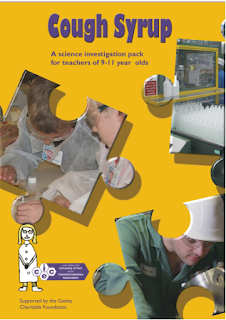 |
| Children from St Thomas More RC primary school during a recent CCI lesson |
In a previous blog post we described how Children Challenging Industry (CCI) schools participate in a staff meeting run by one of our advisory teachers. Additionally, Y5 children from participating schools have the opportunity to visit a local industry where they see science in a real life context. Prior to the industry visit the children enjoy a series of lessons, some of which are run by one of our advisory teachers.
The lessons are made up of several engaging practical activities which help children to understand the industrial scale processes that they will see taking place, and also helps them to make relevant links with the science that they do in school. Su Mennie has been working with St Thomas More RC primary school prior to their visit to Sartorius Stedim Biotech in Royston. The activities that she and their class teacher have been doing come from the CIEC resource Cough Syrup which can be downloaded for free from our website.
The children worked in groups of three or four to choose their equipment and decide how they would measure the effectiveness of the filters being tested. Some groups decided to time how quickly the substance passed through the filters while others devised a scale to measure the clarity of the water after it had passed through the filter. Because the children were given a high amount of autonomy they did not always immediately work in the most efficient or accurate way. However, this led to discussions within the group which were then picked up by Su towards the end of the session. This approach leads to a much deeper understanding of, for example, the most important criteria for assessing the effectiveness of a filter, than if children had been following a more structured method which told them exactly what they had to do and how to present their findings. The activity also gives the children a lot of opportunity to apply the materials strand of the Y5 science curriculum and to rehearse some of the vocabulary.
The session ended with children being given the opportunity to handle and talk about industrial scale filters and to discuss the qualities of the materials that they have been made of and the reasons for their shape. At this point several children were keen to point out how they would like to be able to modify their experiments if they were to do them again. This was a useful assessment opportunity for their teacher as it showed how they were able to apply their content knowledge to the situation as well as demonstrating their growing confidence in working scientifically.


No comments:
Post a Comment